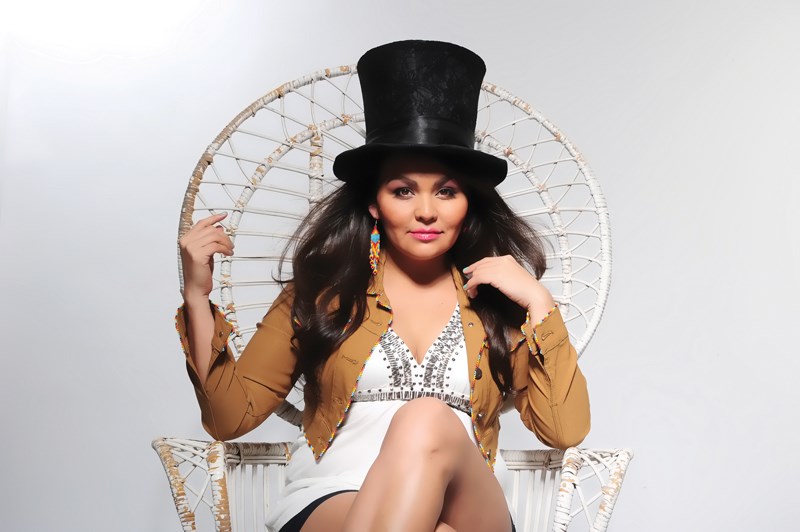Crystal Shawanda performs at the Tsleil-Waututh Cultural Arts Festival, which takes place Sunday, Aug. 21, noon to 7 p.m. at Whey-ah-Wichen (Cates Park), North Vancouver. Event info at facebook.com/tsleilwaututhfestival.
When she sang country, they called it the blues. When she sang the blues, they called it rock ‘n’ roll.
In the hypercritical American music industry, Crystal Shawanda doesn’t always feel as though she fits in.
“Sometimes I feel like a fish out of water trying to learn how to fly,” Shawanda told her mother in frustration one day.
“I think everybody feels that way,” her mom replied. “Why do you want to fit in now? You never have before, so you might as well embrace it and embrace who you are.”
And so she did. That conversation was the spark that inspired Shawanda’s forthcoming album, Fish Out of Water, set for release this fall. It will be the fifth studio album from the Ojibwe singer/songwriter, who grew up on the Wikwemikong reserve on Manitoulin Island in Ontario and moved to Nashville as a teen to pursue her musical career.
“I tried to just record music that I liked. I wasn’t really trying to fit in anywhere with this album,” she says, describing it as a hybrid of country, blues, rock, and soul. “It’s become my trademark to create an emotional roller-coaster ride, and so I think that’s what this album is once again.”
The title track, “Fish Out of Water,” is a song she hopes everyone will be able to identify with.
“We’re all trying to find that place where we fit in in this world and where we make sense, so hopefully people can relate to that.”
The new album has a serious side, Shawanda notes. The song “Skin Deep,” for example, is about racism that exists everywhere – in the music industry, in the Southern United States, in Northern Canada.
“This song is really about treating people the way you want to be treated and looking past somebody’s skin colour.”
At the same time, there’s also lots of room for frivolity on the album. One of her lighter inclusions is a song called “Trouble,” which she describes as “just pure fun, and something that people will be able to dance to.”
Shawanda will perform a mix of new music and old favourites at the eighth edition of the Tsleil-Waututh Cultural Arts Festival on Sunday, Aug. 21 at Whey-ah-Wichen (Cates Park). Co-hosted by MCs Andrea Menard and Gabriel George, the day-long event celebrates indigenous culture and features a musical lineup that includes DJ Shub (formerly of A Tribe Called Red), Coast Salish performance group Children of Takaya, and Musqueam/Tsleil-Waututh rapper Christie Lee Charles. There will also be an artisan village, storytelling tent, traditional foods and other attractions.
Shawanda grew up in a music-loving household. Her parents were country fans and taught her to sing and play guitar, while her oldest brother filled the house with the bluesy rhythms of B.B. King, Muddy Waters, and Etta James. “For my family, music was like a cheap form of therapy,” she says.
She started performing country music in front of audiences when she was just a child.
“Music’s just been my whole life, it’s all I’ve ever done. I first stepped on stage when I was six and started getting paid to do it when I was 10 and haven’t looked back since.”
Her father was a truck driver and she accompanied him down to Nashville for the first time when she was 12.
“Once I visited Nashville the first time I couldn’t get enough of it and I moved there on my own when I was 16 years old,” she says.
Because she moved down South so young, she didn’t have the chance to discover Canada outside of Ontario until her first radio hit “You Can Let Go,” from her debut album Dawn of a New Day, afforded her the chance to tour her home country. Since the success of that first single in 2008, Shawanda has played all across North America and racked up a number of music awards and nominations. Her third studio album, Just Like You, won the Juno Award for Best Aboriginal Album of the Year in 2013.
In 2014, she released her first blues album, The Whole World’s Got the Blues. That recording featured the track “Pray Sister Pray,” which was inspired by and written for missing and murdered aboriginal women across Canada. Earlier this summer, Shawanda released a music video to accompany that song, paying the production costs out of her own pocket.
“It’s a subject matter that’s very important to me and I feel like the awareness needs to keep being circulated,” she says. “The message through the song is that, as women, we need to be braver and bolder than ever. We don’t need to shrink away and hide, we need to be not scared, we need to be more outspoken than ever.”
While she may be based in Music City, U.S.A., Shawanda maintains a loyal fan base in Canada and plays a homecoming concert on Manitoulin Island every summer. Whenever she’s offered a gig here on the West Coast, she says she’s always quick to accept.
“B.C. is one of my favourite places in the world,” she says. “Every time I get a call in for B.C. it’s always a ‘Yes.’”



